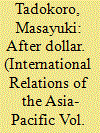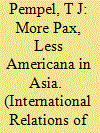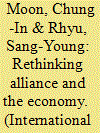|
|
|
Sort Order |
|
|
|
Items / Page
|
|
|
|
|
|
|
| Srl | Item |
| 1 |
ID:
099071


|
|
|
|
|
| Publication |
2010.
|
| Summary/Abstract |
The national currency of the United States, the dollar, plays a critical international role. The privileged position of the dollar, which has greatly facilitated America's role in world politics, is now being questioned. This article argues that the international monetary system tends to be based on hegemony rather than super-sovereignty or multiplicity, and that no serious challengers to the dollar's hegemony have yet emerged. The dollar's predominance, however, is weakening and it has turned into a 'negotiated currency'. If its international roles are to be sustained, the dollar needs to be actively supported by other major economies. 'Negotiation' may fail as rising economies, most notably China, represent American political challengers rather than subordinate allies. Should the dollar cease functioning as the reliable international currency, in the absence of an alternative hegemonic currency, the world could see a more fundamental shift, such as the wider use of private international currencies.
|
|
|
|
|
|
|
|
|
|
|
|
|
|
|
|
| 2 |
ID:
099075


|
|
|
|
|
| Publication |
2010.
|
| Summary/Abstract |
Since the mid-1990s, China has adopted various multilateral policies to shape a more favorable regional environment. The policy of integration, which accommodates both the United States and neighboring countries' core interests, can succeed in achieving China's goals in regional multilateral cooperation. On the contrary, the policies of dominance, co-governance, and guidance have been suffering from frustration or failure because they threaten the core interests of either the United States or China's regional partners. The efficiency of China's multilateral policies is strongly shaped by two factors: the dominant United States wary of China's rapid rise and the substantial power gaps between the two states. In the coming decade, China may rise to the second rank in terms of economic capabilities, but the United States can still maintain its dominant position. So China will adhere to the policy of integration to maintain its favorable regional environment in East Asia. China's rising position and its integration policy will result in the continuation of competition in the regional cooperation mechanisms and the stability of the US regional alliance system in the decade to come.
|
|
|
|
|
|
|
|
|
|
|
|
|
|
|
|
| 3 |
ID:
099073


|
|
|
|
|
| Publication |
2010.
|
| Summary/Abstract |
Northeast Asia presents a major theoretical puzzle: the region is rife with security challenges and seems continually poised for horrific military conflicts. Yet, despite many structural tensions, the region has been devoid of significant shooting wars since the signing of the Korean armistice in 1953. This essay examines two major contributions to that pacific condition: first, the pervasive focus on economic development and the growing economic links across the region; and second, the growing number of multilateral institutions within the Asia-Pacific. It concludes that while a 'Pax Americana' was important to peace in the past, the long-term prospects are for the continued absence of overt conflict but in ways that will reflect an overall decline in America's capacity to shape regional developments.
|
|
|
|
|
|
|
|
|
|
|
|
|
|
|
|
| 4 |
ID:
099074


|
|
|
|
|
| Publication |
2010.
|
| Summary/Abstract |
Alliance coordination involves a multiplicity of equilibria, the resolution of which depends on institutions and knowledge known as focal-point effects. Since the end of the Cold War, the alliance has expanded its missions despite difficult coordination problems by taking advantage of multiple focal factors. Although common threat perceptions have continued to serve as a central focal factor, other factors, such as shared democratic values and international norms, have been used to legitimate the alliance's missions that are beyond what the perceived threats could justify. To be a viable focal factor, common threat perceptions, democratic values, and international norms need to be backed up by the causal knowledge that alliance coordination has stabilizing, confidence-building, and legitimating effects on regional and international security, respectively. More recently, however, the allies' perceptions are becoming more complex and divergent, putting increasing pressures on the other factors for maintaining and expanding the missions. Although democratic values and international norms could generate diversionary effects in broadening Japan's policy horizon, this need not be feared insofar as it contributes to the alliance's basic goal.
|
|
|
|
|
|
|
|
|
|
|
|
|
|
|
|
| 5 |
ID:
099072


|
|
|
|
|
| Publication |
2010.
|
| Summary/Abstract |
The alliance with the United States has not only provided South Korea with a credible military deterrence against North Korea, but also helped normalize its economy through extensive military and economic assistance and assertive policy intervention for macroeconomic stabilization and export drive. South Korea was also one of major beneficiaries of the American-built liberal international economic order. No matter how strong the alliance tie would be, however, major external economic crises or subsequent critical junctures (e.g. the Asian financial crisis of 1997 and the global financial crisis of 2008) tempted South Korea to seek an alternative arrangement by attempting to depart from the US-led economic and financial architecture. Nevertheless, such moves were fundamentally constrained because of the preference of continuing stability in international economic and financial institutions and its renewed emphasis on the alliance in face of North Korea's nuclear threats. South Korea is likely to adhere to the American-led currency regime for the time being.
|
|
|
|
|
|
|
|
|
|
|
|
|
|
|
|
| 6 |
ID:
099070


|
|
|
|
|
| Publication |
2010.
|
| Summary/Abstract |
The 2008 financial crisis and its aftermath have triggered uncertainty about the future of the dollar as the world's reserve currency. China and other countries in the Asia-Pacific region have voiced support for a new global monetary regime. There are both economic and geopolitical motivations at the root of these challenges. Going forward, what will the future hold for the international monetary system? Crudely put, will currency follow the flag? This article addresses this question by considering the economic opportunity and geopolitical willingness of actors in the Pacific Rim to shift away from the current international monetary system - with a special emphasis on China as the most powerful actor in the region. While the dollar has shifted from being a top currency to a negotiated one, neither the opportunity nor the willingness to shift away from the dollar is particularly strong. The current window of opportunity for actors in the region to coordinate a shift in the monetary system is small and constrained. The geopolitical willingness to subordinate monetary politics to security concerns is muted.
|
|
|
|
|
|
|
|
|
|
|
|
|
|
|
|
|
|
|
|
|